|
|
Post by nebsen on Oct 11, 2014 16:40:48 GMT -5
Truthteacher2007,I defer to anansi post about the word Kemet or Khemet & rest my case. You made a statement " The Egyptians were extremely xenophobic people & still are" I do not agree with that statement nationalistic yes, xenophobic no ! Being the worlds first empire they were in contact with all the known peoples of the ancient world of their time esp. the Mediterranean world . Nina G. Jablonski a leading authority on the biology of skin color has written a most interesting book that I highly recommend, called Living Color : The Biological & Social Meaning Of Skin Color, 2012 on page 195 second paragraph " Even in ancient Egypt, where people of different skin tones & appearances came into regular contact, difference in appearance were not impediments to social & economic exchange & meetings were mostly among equals. "
|
|
|
|
Post by truthteacher2007 on Oct 11, 2014 18:37:33 GMT -5
Truthteacher2007,I defer to anansi post about the word Kemet or Khemet & rest my case. You made a statement " The Egyptians were extremely xenophobic people & still are" I do not agree with that statement nationalistic yes, xenophobic no ! Being the worlds first empire they were in contact with all the known peoples of the ancient world of their time esp. the Mediterranean world . Nina G. Jablonski a leading authority on the biology of skin color has written a most interesting book that I highly recommend, called Living Color : The Biological & Social Meaning Of Skin Color, 2012 on page 195 second paragraph " Even in ancient Egypt, where people of different skin tones & appearances came into regular contact, difference in appearance were not impediments to social & economic exchange & meetings were mostly among equals. " Nationalistic, no doubt. Xenophobic, unfortunately, yes, they are. Of course not everybody. However, anyone whose spent time there, especially if they speak Arabic to any degree, and are perceived as bing black, meaning looking stereotypically dark skinned African, as versus light skined=ambiguos. Ask anyone who is Asian, African and living in Egypt, they will tell you the truth that there is that aspect there. It does exist. Let me pu it this way... It's complicated. As far as Anansi's reply. I understand it, but I don't agree that this is proof that they identified themselves as "black people" The translation could very well be people of the black land. The thing is calling one's self "black" in a continent of "black" people is so vague. To call themselves THE black people is to imply that all the other people of Africa were NOT black and so the need to distinguish themselves. The fact is, they were just as dark as most of their neighbors. It just makes no sense. In the earliest period of their history, Egypt was really not that concerned with the world in Western Asia. Doesn't mean they were isolated, or unaware of them. They were just more concerned with themselves and their neighbors to the south. That was where their focus was, farther into Africa, not Asia. It wasn't till much later, after the Hyksos, that their focus shifted or expanded to include them as well. So why choose a characteristic that is also shared by so many other people to identify yourself. Just doesn't make sense to me. Years ago Iman made a comment that caused a lot of flack. She said that in Somalia, no one called themselves black. People were outraged because they thought she was trying to say she wasn't black. What she meant was that everyone was black, so there was no need to state the obvious. |
|
|
|
Post by truthteacher2007 on Oct 11, 2014 19:28:53 GMT -5
It would be naive to ignore the effects of years of imperialism and colonialism on not just Egyptian identity but also that in other parts of Africa and the Middle East. As well as the diaspora. The exact same issues of color and identity one finds in Egypt also have their paralells in the Afro American/Caribbean/Latino communities as well.However, there are Egyptians who are very proud and in the know about their roots and embrace all the layers of their heritage. I fully agree and I know people who share these views. Problem is they often face adversity on all sides. They face opposition at home from those who do not want to acknowledge those parts of themselves, they face it from many members in the Afro American community because they don't look like what they think "a real African" is supposed to look like. It's unfair and hypocitical to do so. I think that as people of the diaspora, whenever we meet brothers and sisters who acknowledge their place in the family, we should embrace them, not alienate them. The other side of this is that quite often the other voices within the Egyptian community are more visable and louder. I would encourage them to be more vocal and let the world know that those voices do not represent all Egyptians. I wish we had more involvement from them on forums such as this. Don't know about ES. I avoid it like the plague because of the viciousness.Although it can seem like a contradiction given the fact Arabisation has been damaging to Africa, not all Egyptians who identify in part as being Arab are automatically denying being Egyptian, and although there might be those with inferiority complex, not all who embrace a dual heritage/heritages have a deep rooted identity crisis. Exactly. And this is another reason whywe need to dissassociate with the Western model of identity. I know Egyptians who identify as Arab, black, African and Egyptian. I know people who identify as Arab, Egyptian and African, but not black, because to them, black means to be dark skinned and they are not dark skinned. However, they don't consider themselves separate from darker skinned Africans. they see themselves as part of a greater extended family. You're right to point out the problems of looking at ancient and modern Egyptians through a Western (often American) racial lens. It is my experience that a great many people in Africa do not see themselves primarily in racial terms. They identify firstly with their ethnic group, then nation, then religion and then by race. Quite often race is only a concern when they are in a foreign environment where they are judgd on their physicality first rather than their personality. It's a conditional response.I think this article by Stephen Quirke sheds light on something many in the west seem ignorant of regarding modern Egyptians www.newstatesman.com/blogs/cultural-capital/2011/03/egypt-antiquities-archaeology Thanks for providing this article. Despite what I said in the previous post, this is also an important dynamic that should not be ignored. Although the French got the ball rolling, it should be acknowledged that there are Natives who are aware and concerned. Are they the majority? No. But let's be honest, are the majority of any people concerned with much beyond getting by? No. But the minority can get ball rolling and become an inspiration to help create awareness in the majority by creating dialog. The Afrocentric perspective was started by a small minority of inspiered and motivated people and it has grown and continues to grow. The problem with Egypt is that there is so little that reaches us here in the West. Part of that may be down to the language barrier, which is why peple such as yourself, (I'm assuming you are Egyptian) are so necessary. I hope that they continue to strive to represent themselves in Egypt and show a broader spectrum of thought on many topics and issues to the larger world. |
|
|
|
Post by nebsen on Oct 11, 2014 20:20:08 GMT -5
Truthteacher2007,I defer to anansi post about the word Kemet or Khemet & rest my case. You made a statement " The Egyptians were extremely xenophobic people & still are" I do not agree with that statement nationalistic yes, xenophobic no ! Being the worlds first empire they were in contact with all the known peoples of the ancient world of their time esp. the Mediterranean world . Nina G. Jablonski a leading authority on the biology of skin color has written a most interesting book that I highly recommend, called Living Color : The Biological & Social Meaning Of Skin Color, 2012 on page 195 second paragraph " Even in ancient Egypt, where people of different skin tones & appearances came into regular contact, difference in appearance were not impediments to social & economic exchange & meetings were mostly among equals. " Nationalistic, no doubt. Xenophobic, unfortunately, yes, they are. Of course not everybody. However, anyone whose spent time there, especially if they speak Arabic to any degree, and are perceived as bing black, meaning looking stereotypically dark skinned African, as versus light skined=ambiguos. Ask anyone who is Asian, African and living in Egypt, they will tell you the truth that there is that aspect there. It does exist. Let me pu it this way... It's complicated. As far as Anansi's reply. I understand it, but I don't agree that this is proof that they identified themselves as "black people" The translation could very well be people of the black land. The thing is calling one's self "black" in a continent of "black" people is so vague. To call themselves THE black people is to imply that all the other people of Africa were NOT black and so the need to distinguish themselves. The fact is, they were just as dark as most of their neighbors. It just makes no sense. In the earliest period of their history, Egypt was really not that concerned with the world in Western Asia. Doesn't mean they were isolated, or unaware of them. They were just more concerned with themselves and their neighbors to the south. That was where their focus was, farther into Africa, not Asia. It wasn't till much later, after the Hyksos, that their focus shifted or expanded to include them as well. So why choose a characteristic that is also shared by so many other people to identify yourself. Just doesn't make sense to me. Years ago Iman made a comment that caused a lot of flack. She said that in Somalia, no one called themselves black. People were outraged because they thought she was trying to say she wasn't black. What she meant was that everyone was black, so there was no need to state the obvious. Please stop conflating your answers. I was speaking of ancient Egypt not modern day Egypt. your answers seem very tone deaf & dismissive. You have a right to believe in your ideas or what ever you want, but they can be contested. I'd rather take the understanding of an authority such as Dr.Nina G. Jablonski over your ideas any day. Also Anansi is not the only one to acknowledge the real meaning of the word Kemet. I have read enough, been to enough lectures on ancient Egypt, by historians & Egyptologist that are way more knowledgeable than myself, & frankly you, to know who stands on solid ground on this matter. I will conclude this discussion with you, because it is starting to feel like a circular exercise in sophistry. Be well ! |
|
|
|
Post by anansi on Oct 11, 2014 22:18:57 GMT -5
Truthteacher said I know my answer can seem off why would the Kemites called themselves black in a continent full of Blacks pre-contact era,perhaps one they like other Africans view themselves as Blacks or Reds this is not to say the "Reds" were outsiders and differed greatly from them,the habit of calling ourselves Black or Red ie Red bone may have along history going back millennia. Take note from this passage. In Nigeria we have Red Igbos and Black just like we do in Jamaica, as was said per Wally's example the Red sea was once called the Black sea Km Wr,now it's called the Red sea anciently known as the Erythraean Sea,although the names of two modern nations Ethiopia and Eritrea is of foreign derivative, Ethiopia is Greek meaning Black land and Eritrea red,but as we all know Ethiopians=Black people a means of self I.D the Eritreans adopt the name Eritrea the Red people keeping in mind these are the same people who recently split apart,at least the Ethiopians consciously choose that name to I.D as Blacks,the Eritreans may have chanced upon on it as the sea that bares that name,that aspect need looking into. Then there is the Benin applique  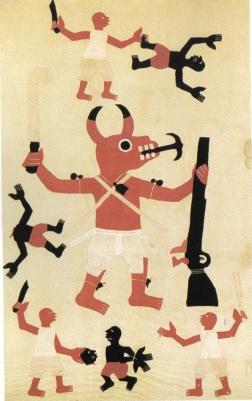 This is showing King Gelele and his troops(Red) dispatching his Yoruba enemies(Black) note the bull in the center in an almost Kemitian like manner, to my eyes and most folks would be hard pressed to find any significant difference between Yoruba and Bene.   Top Modern Bene wedding bottom a group of Yoruba men in council. |
|
|
|
Post by nebsen on Oct 12, 2014 16:50:05 GMT -5
I hear you Nebsen - it's hard not to feel annoyed and aggrieved by this imbalance. Although colonialism has had negative impacts, some people feel that without Napoleon invading Egypt, the country would of gone further backwards under the Ottomans and we might not have any or as much knowledge of the ancient past as we do now. On the subject regarding Black Pharaohs, I think this Tristan Samuels paper sums things up well - www.academia.edu/6242047/The_Black_Pharaohs_Fallacy_Misinterpretations_of_Kush-Kemet_IdentityKarem, Thank you for providing the link to the papers of Tristan Samuels University Of Toronto. What a fresh new & exciting voice in the area of Nubilogy & Egyptology. He really gives me hope for the future in these fields . The old guards are dying off, with fresh new ones arriving such as Tristan Samuels. I love his approach to the subject of Egyptology & Nubilogy & his critique of" white male privilege" in these fields. I'm always on the look out for such voices as Samules, for God knows we need them! I have read two of his papers & I'm very impressed with him & the nuanced thinking he brings. If you know him personally tell him he has a admirer of his work & to keep up the " Good Fight". I rest assured we will be hearing more of him in the coming future. Those members on ESR please check him out ! |
|
|
|
Post by zarahan on Oct 12, 2014 21:20:28 GMT -5
It would take someone like Henrey Louis Gates to do it, but frankly, I don't think he has the balls to do it.
I don;t think Gates has the knowledge to do it. Keita would be a much better choice. Why the heck can;t all these high profile rapper types, who brag about and do drop 100K on a "stripper" party fund a hard-hitting documentary full of scholarship to counter the distortions? 100K could produce a high quality documentary maybe more. ======================================================================== FROM THE SAME TOPIC ON ES (rather than retyp certain points): If anything it is sensible students of Africa's Nile Valley that
are doing justice to ALL the peoples of the Nile valley, not the
selected, light-skinned ones anointed by modern Egyptians or the Euro establishment. It is they who have done justice to the oft airbrushed away, dark-skinned "sons of the soil." While such dark-skinned peoples are despised today in many Egyptian quarters, it is today's African students of the Nile Valley, who have maintained faith with them, showing a more balanced history, that includes, not excludes them.   kemsit- Black ISIS Egyptian Skin Tones - Symbolic & Conventional
Egyptian male (dark)
Egyptian brown skin.....masculine, strong
Black skin.....................powerful, reborn
White skin....................recently deceased
Old Egyptian male (light)
Yellow skin....................weak, frail
Egyptian female (light)
Yellow skin....................feminine, weak
Egyptian brown skin.....equal of men (Amarna period)
Black skin.....................powerful, reborn
Egyptian gods
Gold skin......................flesh of the gods.
Kem, kame, kmi, kmem, kmom = to be black
Kememu = Black people (Ancient Egyptians) in both Ancient and modern Egyptian (Kmemou).
Kem [khet][wood] = extremely black, jet-black
Kemet = any black thing. Note: “t” is silent – pronounced Kemé
Kemet [nu][community, settlement, nation] = Black nation = Ancient Egypt.
Kemet [Romé][people] = Black people. Ancient Egyptians.
Kemit [Shoit][books] = Black books, Ancient Egyptian literature.
Kem wer [miri][large body of water] = The Great Black sea (The Red sea). This sea is neither black nor red, this is in reference to which nation, Black or Red, at a particular time, controlled this body of water.
Kemi fer = Black double house; seat of government. Note: by reference to Wolof again, we know that to make a plural of per or house, the “p” becomes an “f” or fer. Thus fero=great houses (double), it is not pero as Budge writes.
In Ancient Egyptian, the ordinary adjective always follows the noun it modifies, whereas a sanctified adjective usually comes before its noun. The sanctified adjectives are:
Kem — Black
Suten – Royal
Nter — Holy, Sacred
Examples:
Kem ti = Black image, sacred image : ti oubash = white image
Kem ho = Black face/title of a god : ho oubash = white face
Kem ta = Black land, holy land : Ta deshret = Red land (also; Ta Sett)
This rule does not apply when Black is used as a noun-adjective of nationality:
Hompt Kemet = copper of Black; Egyptian copper : Hompt Sett = copper of the Red nations; Asiatic copper
Ro in Kemet (page 416a) = speech of Black; mute ro n Kemet = word of the mouth of Black; the Egyptian language
Kemet Deshret = Black and Red; good and evil; fertile and barren, etc.; Duality
Deshretu (page 554a,b) = red ones, red devils. Used also to refer to the Namu and Tamhu; not a complimentary label.
------------------------------------------------------------------ ^^Good info Anansi. DO you know where Wally got these explanations?
|
|
|
|
Post by zarahan on Oct 12, 2014 21:31:42 GMT -5
 ^^Thanks for this pic Anansi on the "Red Igbo"- showing the diversity of Africans who don't need any "race mix" to have fair skin or other features. Recap for the new users from an old ES thread: a) Tropical Africans have the most BUILT-IN NATIVE
skin color DIVERSITY. Light skin in Africa is nothing unusual,and occurs in a range from West Africa (i.e. the "Red Igbo") to the vast expanses southern Africa, (the San) to the desert peoples of the Sahara and Sahel, to parts of East Africa. Light brown or yellowish skin is just as native to tropical Africans as darker skin. Naturally regions with more UV radiation will yield more darker skinned people, on the average, but that does not negate the built-in, baseline diversity of tropical Africans. 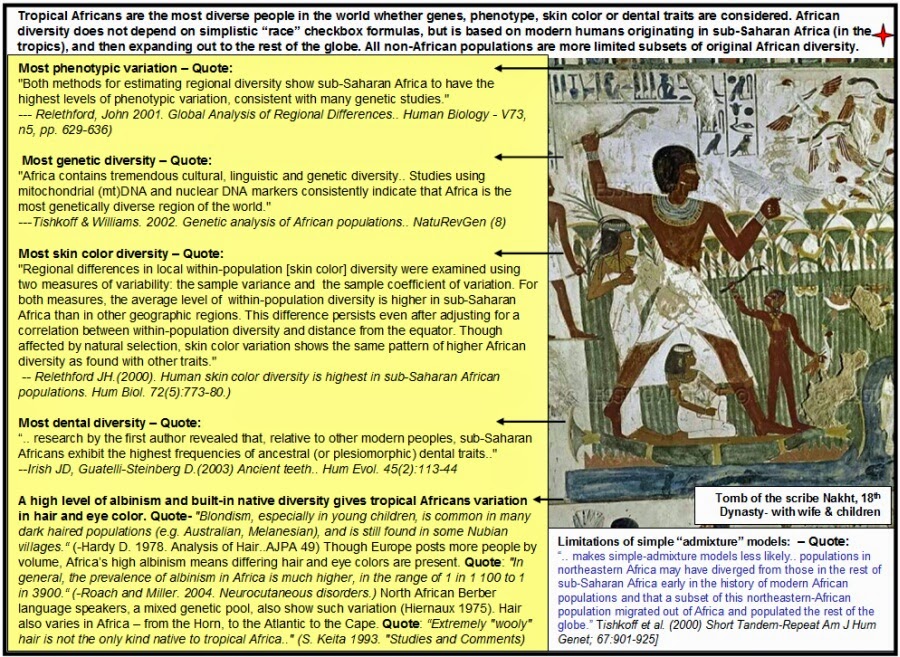 QUOTE: "Previous studies of genetic and craniometric traits
have found higher levels of within-population diversity
in sub-Saharan Africa compared to other geographic regions. T
his study examines regional differences in within-population
diversity of human skin color. Published data on skin
reflectance were collected for 98 male samples from eight
geographic regions: sub-Saharan Africa, North Africa, Europe,
West Asia, Southwest Asia, South Asia, Australasia, and the
New World. Regional differences in local within-population
diversity were examined using two measures of variability:
the sample variance and the sample coefficient of variation.
For both measures, the average level of within-population
diversity is higher in sub-Saharan Africa than in other
geographic regions. This difference persists even after
adjusting for a correlation between within-population
diversity and distance from the equator. Though affected
by natural selection, skin color variation shows the same
pattern of higher African diversity as found with other traits." --Relethford JH.. 2001. Human skin color diversity is highest in sub-Saharan African populations. Hum Biol. 2001 Oct;73(5):629-36. -------------------------------------------------------------- b) While other regions lead by volume as far as
pale skin, an isolated INDIGENOUS African population
could already have been in place, that over time and migration cycles, leave behind phenotype variants having lighter skin. 
c) INTERNAL NATIVE migration WITHIN Africa could
produce variation without needing any "Caucasoids."The variable micro-climates within the continent, from cool temperate zones to dry desert, to more humid lowland helps to produce variation. Cool high altitudes or dry desert both can produce narrower noses over time for example, although the diversity of Africa means differing phenotypes in every zone unbound by any climatic "apartheid" barriers.  ^^Africa's numerous climatic zones allow for plenty of physical variation, ON TOP OF and IN ADDITION TO tropical African's already greater built-in genetic diversity- the most in the world. ----------------------------------------------------------
(d) Documentary evidence suggest that so-called "Red Igbo"
were ALREADY in place BEFORE any significant appearance of
white Europeans. Famous African (and ex-slave captive)
Olaudah Equiano's detailed account of his people
the Igbo, shows that fair skinned people were
already in place before Europeans arrived. QUOTE: "Badsen [GT Badsen, "Niger Ibos," Frank Cass and Co, London, 1938: 123-124], in his early-twentieth century study of the physical appearance of the Igbo, had this to say:
'On the whole, the Ibos are of good physique and compare favorably with other African trives.. Many Ibos are truly as black as the proverbial coal: others are almost as light-skinned as the natives of Southern Europe, while a few are distinctly reddish. The folk who stand out obstrusively are the albinos.'" --Gloria Chuku (2013) The Igbo Intellectual Tradition. pp 48-49 QUOTE:
"He disengaged himself from other life experiences
and went back to a particular spot in his memory
to capture the racial distinctions he was able
to make. He saw no distinction in skin color
between the red men in Igboland and the white men
he met on the slave ship. "--Jacob Korieh. 2009. Olaudah Equiano and the Igbo world: history, society and Atlantic. 2009
" Oye-Eboe" may be a version of the Igbo word
oyibo used in the nineteenth century to mean
"white man," Equiano clearly uses it to refer to
other Africans, perhaps the Aro slave traders. At
this point in is life, he tells us, he had not
yet seen or even heard of a European." -- Vincent Carretta. 2005. Equiano, the African: biography of a self-made man. p15 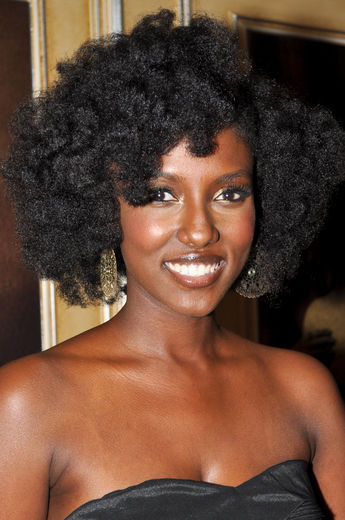 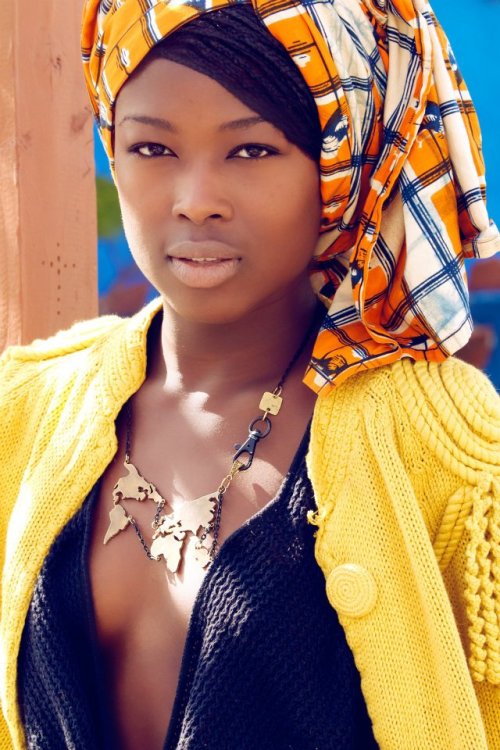 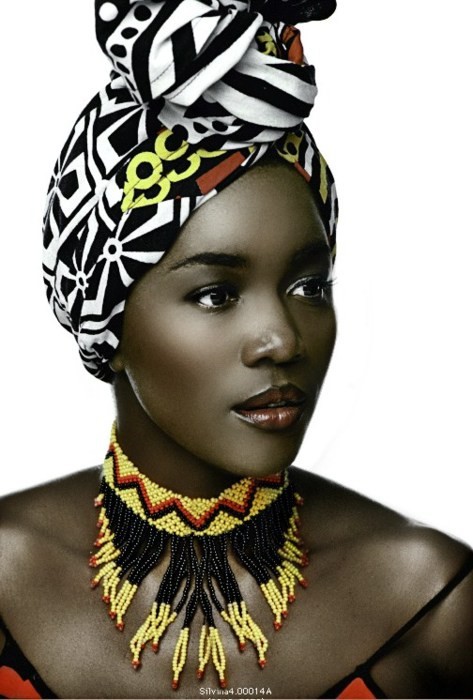  Lighter skin is nothing new and nothing unusual in West Africa's Igbo region, or in Africa, and does not need any "outside race mix" to explain why.  The San further south are yet another example of NATIVE skin color The San further south are yet another example of NATIVE skin color
variation.. with no "race mix" needed to explain why.. |
|
|
|
Post by truthteacher2007 on Oct 12, 2014 21:39:34 GMT -5
Nationalistic, no doubt. Xenophobic, unfortunately, yes, they are. Of course not everybody. However, anyone whose spent time there, especially if they speak Arabic to any degree, and are perceived as bing black, meaning looking stereotypically dark skinned African, as versus light skined=ambiguos. Ask anyone who is Asian, African and living in Egypt, they will tell you the truth that there is that aspect there. It does exist. Let me pu it this way... It's complicated. As far as Anansi's reply. I understand it, but I don't agree that this is proof that they identified themselves as "black people" The translation could very well be people of the black land. The thing is calling one's self "black" in a continent of "black" people is so vague. To call themselves THE black people is to imply that all the other people of Africa were NOT black and so the need to distinguish themselves. The fact is, they were just as dark as most of their neighbors. It just makes no sense. In the earliest period of their history, Egypt was really not that concerned with the world in Western Asia. Doesn't mean they were isolated, or unaware of them. They were just more concerned with themselves and their neighbors to the south. That was where their focus was, farther into Africa, not Asia. It wasn't till much later, after the Hyksos, that their focus shifted or expanded to include them as well. So why choose a characteristic that is also shared by so many other people to identify yourself. Just doesn't make sense to me. Years ago Iman made a comment that caused a lot of flack. She said that in Somalia, no one called themselves black. People were outraged because they thought she was trying to say she wasn't black. What she meant was that everyone was black, so there was no need to state the obvious. Please stop conflating your answers. I was speaking of ancient Egypt not modern day Egypt. your answers seem very tone deaf & dismissive. You have a right to believe in your ideas or what ever you want, but they can be contested. I'd rather take the understanding of an authority such as Dr.Nina G. Jablonski over your ideas any day. Also Anansi is not the only one to acknowledge the real meaning of the word Kemet. I have read enough, been to enough lectures on ancient Egypt, by historians & Egyptologist that are way more knowledgeable than myself, & frankly you, to know who stands on solid ground on this matter. I will conclude this discussion with you, because it is starting to feel like a circular exercise in sophistry. Be well ! I'm not conflating anything. If there's any negativity in my responses it's totally the way you choose to see it because nothing of the kind is intended. Believe me, when I want to insult someone, you never have to second guess my meaning. I'm as clear as crystal. I never imply anything, I get straight to the point. If I think you're an ass, I have no problem saying so. So until such day, you can take it as a safe bet that I think you're cool and all is well with the world, we just happen to have a diference of opinion and that's all there is to it. As for the Egyptians attitude? Did they have a xenophobic streak? Yes. They did then and they do now. My original statement was addressed to both the modern and ancient population. it just is what it is and I base my statement on the attitudes that they themselves express. As for the whole KMT thing, we just agree to disagree, it's that simple. It just doesn't make sense to me for the reasons I stated and it's just that simple. Yes, I know they were Native Africans, but the whole black thing, no, I don't believe that. You do, fine and the sun will still rise in the morning |
|
|
|
Post by zarahan on Oct 12, 2014 21:44:44 GMT -5
Nebsen said: he Egyptians were extremely xenophobic people & still are" I do not agree with that statement nationalistic yes, xenophobic no ! Being the worlds first empire they were in contact with all the known peoples of the ancient world of their time esp. the Mediterranean world . Nina G. Jablonski a leading authority on the biology of skin color has written a most interesting book that I highly recommend, called Living Color : The Biological & Social Meaning Of Skin Color, 2012 on page 195 second paragraph " Even in ancient Egypt, where people of different skin tones & appearances came into regular contact, difference in appearance were not impediments to social & economic exchange & meetings were mostly among equals. " I see what you are saying- some might use xenophobic as a way to downplay the African character of the Egyptians. We know that the Egyptians did not like foreigners, BUT if any try to play the "xenophobic" card, they are STILL defeated on 3 strikes: 1) NATIVE Egyptians include dark-skinned, broad nosed types from earliest times. Such are not "outsiders" or "foreign" to Egypt. 2) Some of the "foreigners" they hated are the closest people ethnically to Egyptians as noted by various scholars. These closest cousins are the Nubians.   3) Egyptians are indigenous tropical Africans who themselves have the highest skin color diversity, and other diversity in the world. Your Jablonski reference shows the skin color side of this.  That's 3 strikes. They out... Truthteacher says: Did they have a xenophobic streak? Yes. They did then and they do now. My original statement was addressed to both the modern and ancient population. it just is what it is and I base my statement on the attitudes that they themselves express.I am not 100% convinced on the black people versus black soil theory either either, but I believe the theory is worthy of consideration. But in any case, no matter how modern Egyptians or Eurocentrics try to "distance" the ancients from Africans, it makes little difference because "black" is NATIVE to Egypt, "black" Nubians are the closet cousins to Egyptians, and the diversity of Africans means they can come with a variety of features and shades, without needing "wandering Caucasoids" "Asiatics" or "Middle Easterners" to explain why. |
|
|
|
Post by zarahan on Oct 12, 2014 22:19:30 GMT -5
I think this article by Stephen Quirke sheds light on something many in the west seem ignorant of regarding modern Egyptians www.newstatesman.com/blogs/cultural-capital/2011/03/egypt-antiquities-archaeology The article says: A third radical move would be a shift towards an Egyptian archaeology,
where "Egyptian" means both by Egyptians and in Egypt. The article writer neglects a FOURTH radical move, which would be full recognition of Egypt's African heritage rather than the hypocitical denial, dismissal or down- playing all too common among many modern Egyptians, who don't mind a light skin being put up front as "representative", but dispute a black one as "foreign" or "un- Egyptian." It is really black Americans and other African studentsof the Nile Valley that are maintaining faith with the forgotten and dismissed darker, "sons of the soil." Witness the hypocritical response to a black actor playing Anwar Sadat some years ago- even though Sadat was just as black as millions of Africans and African-Americans. It would really be a radical move for many of today's Egyptians put aside that hypocrisy.  Oh, and numerous pharaohs are "black" long BEFORE the "black" 25th Dynasty where some would "confine" them.  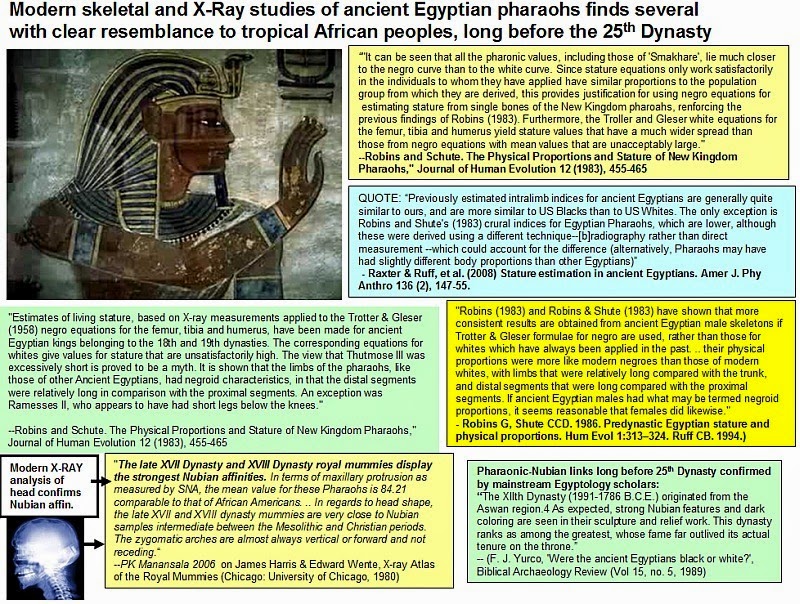
|
|
|
|
Post by truthteacher2007 on Oct 12, 2014 22:45:04 GMT -5
Truthteacher said I know my answer can seem off why would the Kemites called themselves black in a continent full of Blacks pre-contact era,perhaps one they like other Africans view themselves as Blacks or Reds this is not to say the "Reds" were outsiders and differed greatly from them,the habit of calling ourselves Black or Red ie Red bone may have along history going back millennia. Take note from this passage. Okay. Here's the problems I have with this: Firstly, this is an ancient document. We are interpriting it in modern times. Can we take it literally? Case in point, in our modern day language we often say something is bad or wicked. If we take it literally at face value we would come away with the totally opposite meaning. Therefore, how do we know that red and black arerefering to skin color and not something else? For example, the Tuaregs are often called the blue people. Is this refering to their skin color? No. It refers to their clothing. The robes and turbans they wear are dyed a deep ble or indigo color and because this is their favorate dress, they are called blu people. Could red and blue be descriptions of traditional body paint, or articles of clothing, or something else entirely? There's no way for us to know exactly what they mean. For example, Southern Europeans are called olive skinned. Olives are either deep dark purple or green. Nobody anywhere is green or dark purple.In Nigeria we have Red Igbos and Black just like we do in Jamaica, Yes, but this color variation is seen within the group. They are not separate populations. Egyptians also had a range of skin tones. For example, the ginger mummy from the predynastic era, is relatively light skinned, but in the Chicago Museum, ther's a mummy from the old kingdom on display that is very dark complected. The Egyptians to the besy of my knowledge didn't talk about red people. There was KMT and there was DZRT=the red land. Taken together it take this to mean that the terms are descriptions of the land. The soil in Egypt is literally black, very black. The desert starts literally on the edge of the cultivated land. You can literally stand with one foot in black fertile soil and the other in dry red desertas was said per Wally's example the Red sea was once called the Black sea Km Wr,now it's called the Red sea anciently known as the Erythraean Sea,although the names of two modern nations Ethiopia and Eritrea is of foreign derivative, Ethiopia is Greek meaning Black land and Eritrea red,but as we all know Ethiopians=Black people a means of self I.D the Eritreans adopt the name Eritrea the Red people keeping in mind these are the same people who recently split apart,at least the Ethiopians consciously choose that name to I.D as Blacks,the Eritreans may have chanced upon on it as the sea that bares that name,that aspect need looking into. And here in lies the rub. It was outsiders who initiallyapplied this name to them. It wasn't the name they called themselves. In time, they adopted the name for their country. Did they know what it meant? I don't know. Or was it just that they knew that it was a term applied vaguely to the area below Egypt and they liked the way it sounded? As for Eritria, what difference in color is there between Eritrians and Ethiopians? Eritria was once just the eastern region of Ethiopia. Thy ony started calling themselves Eritria after split from Ethiopia. I think this was the region that the Italians were able to steal away from Ethiopia. I could very well be mistaken, have to look it up. Then there is the Benin applique   This is showing King Gelele and his troops(Red) dispatching his Yoruba enemies(Black) note the bull in the center in an almost Kemitian like manner, to my eyes and most folks would be hard pressed to find any significant difference between Yoruba and Bene. And once again, how are we to interpit this? No one is literally black. They're brown. So obviously this is artistic convention. Why the different colors? Is it meant to convey something literal, or is it just artistic license?   Top Modern Bene wedding bottom a group of Yoruba men in council. |
|
|
|
Post by anansi on Oct 13, 2014 3:59:51 GMT -5
Zarahan said If I remember correctly he got it from Budge's dictionary his site is now off line,but also Diop had much the same translation way earlier. As for the argument for a Black land or Black community I don't see why it couldn't be both    Ok see what I mean and trust me I ain't no expert but this is what I know see the crocodile scale in front that's the glyph for Black next to it is sign for community below is two mound signs meaning two lands, the second glyph croco's scale The one with the owl and the half sun plus the x thing or cross roads would make it literally the black community,and on top the Black Nation given the male female glyph croco's skin out front,so all these glyphs could mean black land as in soil,another could mean community and yet another could mean the Black nation. medu.ipetisut.com/index.php?og=Land%20of%20begining Here is a cheat sheet on medu ntr it's a plug in kinda of fun but be cautious |
|
|
|
Post by anansi on Oct 13, 2014 4:44:42 GMT -5
Truthteacher
Yes the Tuaregs are referred to as the Blue men,but in the case of the Red and Black Noba skin color is being implied here, also if you read the Kebra Nagast,reference is also made to Black skin color their own that is.
In another part of Africa the Dogon made mention of red skinned Pygmies that inhabited the cliff at the time of their arrival
What I am saying is terms such as Black and Red used for complexion is quite old in Africa the fact that we vary slightly even in terms of immediate family may not passed unnoticed, the color Black was a sign of rejuvenation or life may take on a surprisingly modern meaning despite the variations among themselves their take Black is sacred ours Black is beautiful,ours was born out of self reaffirmation theirs from cosmology.
In the case of Ethiopia it was deliberate the country's name formally was known as Abyssinia,Eritreans maybe the name just sound kool but yes they are pretty much the same people despite the bad blood.
|
|
karem
Craftsperson

Posts: 74 
|
Post by karem on Oct 13, 2014 5:39:36 GMT -5
I think this article by Stephen Quirke sheds light on something many in the west seem ignorant of regarding modern Egyptians www.newstatesman.com/blogs/cultural-capital/2011/03/egypt-antiquities-archaeology The article says: A third radical move would be a shift towards an Egyptian archaeology,
where "Egyptian" means both by Egyptians and in Egypt. The article writer neglects a FOURTH radical move, which would be full recognition of Egypt's African heritage rather than the hypocitical denial, dismissal or down- playing all too common among many modern Egyptians, who don't mind a light skin being put up front as "representative", but dispute a black one as "foreign" or "un- Egyptian." It is really black Americans and other African studentsof the Nile Valley that are maintaining faith with the forgotten and dismissed darker, "sons of the soil." Witness the hypocritical response to a black actor playing Anwar Sadat some years ago- even though Sadat was just as black as millions of Africans and African-Americans. It would really be a radical move for many of today's Egyptians put aside that hypocrisy.  Oh, and numerous pharaohs are "black" long BEFORE the "black" 25th Dynasty where some would "confine" them.   You're right Zarahan, a fourth move to admit Ancient Egypt's African genesis is certainly called for - I think Stephen Quirke might be of that mind set. Furthermore, including and engaging more with African and African American scholars is only fair, as is more engagement with modern Egyptians, both in the diaspora and at home. What things do you feel would make it more possible to create an inclusive, fair and balanced approach to Egyptology ? I've heard about the Sadat film that was cancelled due to colour phobia. That was sad and it would of made for an interesting movie. Modern Egyptians, like anyone else, should be free to choose how they self-identify. As in other countries, politicians in Egypt might of been ignoring issues of colourism, gender, religion and class in the name of 'national unity'. There are still those issues today. |
|